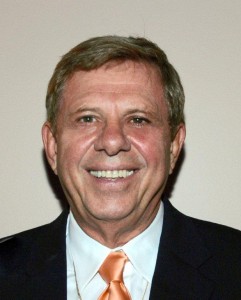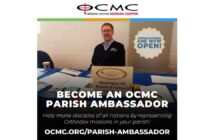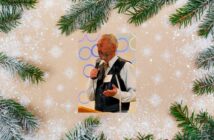Source: Orthodox Christian Laity
“How good and pleasant it is when brothers live together in Unity.” Psalm 133:1
What a joy it is to hold our OCL meeting at the Orthodox Christian Mission Center (OCMC), a truly pan-Orthodox outreach mission to the world. The agency has had its struggles and triumphs, but working together in unity, they make a difference for Christian outreach. Together with IOCC, they are examples of what we accomplish in unity. Can you imagine if the Orthodox Christian Church in the USA was united – what we can accomplish? A unified Orthodox Christian Church would be able to address the destruction of our faith in the Middle East and in Central Europe. The Church would be more effective in fulfilling its mission in this multicultural world. The geo-political atmosphere globally is extremely explosive and “sensitive” at this time which creates more complex challenges for Christianity everywhere.
Am I dealing with the same Orthodox Church or are the regional customs and mores very local in our country? It is amazing to me what a difference four months’ time and planning a meeting in a different geographic area feels like. Planning a meeting in NYC area in the fall is a different experience than planning a meeting at OCMC in Jacksonville, FL. Here in the Jacksonville area, I have learned that there is resistance to the idea of Orthodox Christian Unity. I have been told directly that the Church is the boundary of the parish property. The faithful are not interested in what goes on nationally or even internationally or even next door. They are focused on their own communities. The idea of holding a pan-Orthodox vesper and open forum to update the area laity met with great resistance. The clergy association was not interested, and each individual parish I contacted had excuses for why it would not be a venue that would attract the faithful. Finally, our OCMC contact person suggested we hold the forum at OCMC in the afternoon. Many of the interested faithful are elderly,and we might attract them if they did not have to drive at night. Planning this meeting in this place is important, because it helps you to see the whole reality of the challenges facing the Church in its quest for unity. Facing such resistance that I did, made me more determined to hold such a meeting here. There is no key contact person here, but we have done the best we can. After 27 years, OCL continues to face these obstacles in varying degrees, throughout the country. Some Orthodox hierarchs, clergy and laity appear to believe that the “readiness moment” – the time for unity – is not right.
In planning for this meeting, I sent an email to the OCL board members for agenda items. The very perceptive Evan Chriss, our oldest board member, sent me this item:
AN ITEM FOR OCL’S CONSIDERATION:
True unity will not come if it is only from the Hierarchy. It must include the full and enthusiastic support of the laity.
Unfortunately, it has been my experience that the vast majority of the Orthodox laity is unaware of the unity effort. It has also been my experience that Orthodox laity from the several jurisdictions in each city do not work together and for the most part do not know each other.
Programs must be developed to correct this unfortunate situation. Evan A. Chriss
The Challenge remains: How do we involve clergy associations and the laity in the process of working toward Orthodox Christian Unity?
What is the charge given to the Assembly of Bishops?
I have reviewed the rules of operation of the Assembly issued in 2009 and thought it important that we examine the charge to the Assembly listed as competencies. Is there a way for us to evaluate their fulfilling these competencies in the past 5 years?
The competencies of the Episcopal Assembly are:
- to safeguard and contribute to the unity of the Orthodox Church of the Region in its theological, ecclesiological, canonical, spiritual, philanthropic, educational and missionary obligations.
- The coordination and leadership of activities of common interest in areas of pastoral care, catechesis, liturgical life, religious publishing, mass media, religious education, etc.
- Relations with other Christian Churches and other religions.
- Anything that entails obligations of the Orthodox Church in Her relations with society and government.
- The preparation of a plan to organize the Orthodox of the Region on a canonical basis.
Update on Unity: What I learned.
For the last month,I have been gathering information from various formal and informal sources to understand what progress the Assembly of Bishops is making in accomplishing what it has been charged to do, which is to bring canonical order to the Church in this geographic area – the USA. After five years of working as an Assembly, are we closer to canonical order, which is a Unified Orthodox Christian Church? I have put together for your consideration an overview that I was able to gather from various sources. My conclusions are, and I think we should discuss:
Does the Assembly define union and unity in the same way?
- What is a good definition of unity? Is union and unity the same thing? How do we address the unity issue in terms that people understand and agree with us?
- What are the concerns that exist hindering the progress toward unity? What makes people resist the concept of unity? How do we address concerns so people want unity?
During the last four months, it seems that there have been a few accomplishments, mainly due to the efforts of a layperson-researcher, Alexei Krindatch. The report on the overview of the monastic communities was presented in January. He is presently developing a survey on Stewardship.
OCL was asked to post and help get the word out about the stewardship survey. The pastoral care committee has also presented a comprehensive report. The jurisdictions missed the December deadline to present feedback on a document that they agreed in October to evaluate by December. Only the Bulgarians and ROCOR have sent their feedback by December. Both stated they do not feel the Church in the USA is ready for unity. They have put the Assembly on notice that they will not be part of a consensus process. ROCOR has stated that they will not consider Administrative Unity until the pastoral issues are put in order. They have taken a hard line on this matter. Bulgarian bishops say they will never separate from their mother country. Because of the lack of feedback from the other jurisdictions and the feedback received from ROCOR and Bulgarian bishops, the original document set forth for modification at the October meeting cannot be modified. The special meeting of Bishops that was scheduled for March to go over the modified document has been postponed. Will there be a plan to set timelines and goals for Unity ready in June? If there is a plan, what kind of plan will be presented to the pre-Conciliar Committee working on the agenda for the Great Council? Maybe the plan will be to ask the Patriarchs to solve the issues and set a timeline?
It seems that the Assembly of Bishops is most interested in working on the pastoral care issues (item B in competencies cited above). There is some interest in coordinating youth programs. There is slow progress in this area. OCF is still disorganized and needs a new board. The Assembly of Bishops is interested in having a unified PR program so that it looks like they are working together. Their website has been improved.
From the data that I have been able to obtain, I concluded that the Assembly is making incremental progress but not real progress in preparing a plan by 2016. There is little movement forward. In addition, changes in the Antiochian Archdiocese and events in Syria and the Middle East have muted their voice on the subject of unity. They have moved to a “wait and see” attitude and do not want to be out front so that the Mother Church feels threatened. The GOA and OCA appear to be the advocates for unity. A multicultural, unified Orthodox Christian Church in the USA would be able to assist the ancient Patriarchates with a unique perspective and would be able to make more people aware of the plight of Christians in the Middle East and Central Europe. Perhaps OCL can have as its core theme for the Annual Meeting a Program: “Christian Genocide in the Middle East.”
What can be done to move ahead?
The Assembly seems to be in a holding pattern and backtracking. How can the laity help to energize the bishops to move ahead? OCL may need to attempt to work to energize Clergy Associations to participate in the Unity Process by becoming active laboratories of unity. In the recent “pan-Orthodox” Epiphany Services in West Palm Beach, FL, His Eminence Metropolitan Alexios lamented the fact that there were fewer clergy participants of other jurisdictions this year than in the past. He promised to work on this so that next year more priests of other jurisdictions would be present. The choir was truly pan-Orthodox, and the congregation was a multicultural gathering of Orthodox Christians. We know that the bishops need to work with the clergy and encourage them to set up inter-Orthodox Programs locally, including work with seniors, youth, and education. Why keep duplicating these efforts?
Should OCL address a letter to the Chairman of the Assembly and all of the Bishops? We are mindful of the domestic and international challenges impacting the process and progress they are making. But they were called to make canonical order in preparation of a Council meeting in 2016 in Turkey. Could they update the faithful with a progress report? What are the obstacles? How can clergy and laity be involved to assist them?
Should OCL executive and advisory board members make an appointment to meet with Archbishop Demetrios, Chairman of the Assembly, to discuss issues presented in this report?
Additional Updates
- The year-end mailing was sent to 1,000 consistent donors with one of the 1,000 books that we had in storage. This seemed a prudent way to disseminate the books that we had on hand. We have received positive feedback from some of the recipients. The mailing returned about $9,000 in revenue.
- OCL has supported start-up groups and conferences and is seen as a catalyst and encourager of pan-Orthodox Programs. We continue to support youth programs and promote and advocate for developing Orthodox Christian Fellowship (OCF). We support and provide technical assistance to the Pan-Orthodox Youth Program developed by board member Michael Pacurar.
- We supported the St Phoebe Center on the History of the Deaconess Conference held in NYC in December 2014. Teva Regule has been our contact person.
- We supported the development of Seeds of Hope – an Orthodox Christian Healing and Counseling Service. Founder is our advisory board member Sonja Anderson who has just moved to Omaha, NB.
- OCL should support the June 25-27, 2015 Orthodox Theological Society of America (OTSA) Conference, Fordham University, Manhattan Campus. Board member Gayle Woloschak is President of the organization and Teva Regule is Treasurer. All sessions of this year’s OTSA meeting will be dedicated to the upcoming Great and Holy Council of the Orthodox Church, which is scheduled to begin in Constantinople/Istanbul in 2016. As a result, conference organizers seek proposals for 20-minute Papers or Poster presentations*, according to one of the following themes, each of which is on the Agenda for the Great and Holy Council:
- Autocephaly and Diaspora
- The Canonical Impediments to Marriage
- Ecumenical Relations
- The Contribution of the Orthodox Church to the Realization of Justice, Freedom, Brotherhood, and Love among Peoples
- Fasting regulations
Please send 100-150 word abstracts (for both Paper and Poster presentations) to the president of the society, Dr. Gayle Woloschak ([email protected]), by March 1, 2015. Notification of acceptance will be completed by April 1.
- The OCL Web site schedule of events, updated by Marlene Buettner, is a popular feature. Buettner reports that during the last 4 months there have not been as many events planned around the county as there were in other years.
OCL Office Report and Web Report are developed by Joanne Nikides and (Archdeacon) David Oancea. The update of the work of the Assembly of Bishops will be recorded for the OCL website by Board Member Peter Zarras. A telephone conference call to include all board members not attending the meeting was scheduled for 4:00 pm Friday, February 20th at 4:00 pm Eastern Time.
George Matsoukas, Executive Director
[subscribe2]




